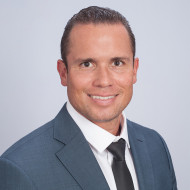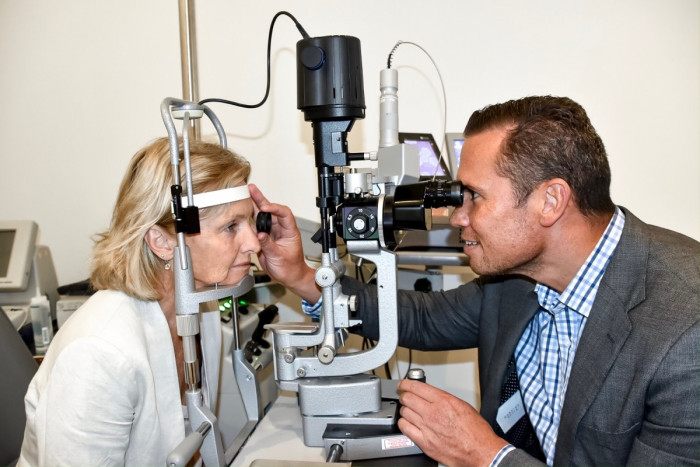Ophthalmologist
Tākuta Whakaora Whatu
Alternative titles for this job
Ophthalmologists diagnose and treat eye conditions and injuries, and perform eye surgery.
Pay
Trainee ophthalmologists can earn
$64K-$205K per year
Qualified ophthalmologists can earn
$170K-$251K per year
Source: ASMA and RDA, 2022-24
Job opportunities
Pay
Pay for ophthalmologists varies depending on skills and experience.
Ophthalmologists who work for Te Whatu Ora Health NZ (previous DHBs)
- House officers (supervised junior doctors) can earn $64,000 to $145,000 a year.
- Registrars (trainee ophthalmologists) can earn $80,000 to $205,000.
- Qualified ophthalmologists can earn $170,000 to $251,000.
Ophthalmologists working in the private sector can earn more than this.
Sources: Association of Salaried Medical Specialists, 'New Zealand District Health Boards – Senior Medical and Dental Officers Collective Agreement, 1 April 2022 - 31 March 2023'; and Resident Doctors' Association, 'RDA and 20 District Health Boards Multi Employer Collective Agreement 17 March 2021 to 31 March 2024'.
- Te Whatu Ora website - Senior Medical and Dental Officers Collective Agreement 1 April 2022- 31 March 2023 (PDF - 704KB)
(This information is a guide only. Find out more about the sources of our pay information)
What you will do
Ophthalmologists may do some or all of the following:
- diagnose eye conditions, such as cataracts, and eye injuries
- perform eye exams
- discuss and prescribe medications
- perform eye surgery
- check patients' progress after an operation
- write prescriptions for glasses and contact lenses
- consult with other medical professionals about patient care and treatment
- keep medical records and send reports to general practitioners and optometrists
- teach medical students and trainee ophthalmologists
- carry out research.
Skills and knowledge
Ophthalmologists need to have knowledge of:
- the anatomy of the eye and how vision works
- eye conditions, such as glaucoma and cataracts
- medical conditions that can affect the eyes, and how to diagnose them
- how to perform different types of surgery on the eyes, including laser treatment
- latest research, treatments, technology and practices in eye care
- medical ethics and law.
Working conditions
Ophthalmologists:
- usually work regular business hours, but may also work evenings and weekends
- work in hospitals and clinics
- travel locally and overseas to conferences and meetings.
What's the job really like?

Will Cunningham
Ophthalmologist
Changing lives by improving eyesight
Ophthalmologist Will Cunningham enjoys knowing he's able to make a real difference in people’s lives.
“We can stop someone with diabetes from losing their vision by using lasers to prevent the blood vessels bleeding at the back of the eye," he says.
Using technology to help people
Because he works with specialised equipment, the eye surgery Will performs is often over quickly.
“It’s exciting that by removing a cataract you take someone from having little vision to having 20/20 (normal vision) in just ten minutes. People are so grateful.
“You do need to have a real passion for the job because you’re treating a lot of patients.”
Benefits of working in ophthalmology
“One of the attractions of ophthalmology is a better work-life balance because you’re working more regular hours than many other medical specialities," says Will.
And there are diverse opportunities, including a chance to travel.
“I’m doing research to find ways to improve poor eye health among Māori and Pacific people, and pro-bono work [providing a free service to those unable to afford it] across the Pacific Islands.
“I’m fortunate to use my skills for the benefit of local people and to teach them about eye care.”
Entry requirements
To become an ophthalmologist you need to:
- complete the Health Sciences First Year programme at the University of Otago, or the first year of either the Bachelor of Health Sciences or Bachelor of Science in Biomedical Science at the University of Auckland
- complete a Bachelor of Medicine and Bachelor of Surgery (MBChB) degree at the University of Auckland or Otago
- work for two years as a house officer (supervised junior doctor) in a hospital
- work for another five years as a registrar with specialist training and passing examinations to become a Fellow of the Royal Australian and New Zealand College of Ophthalmologists.
You also need to be registered with the Medical Council of New Zealand.
- University of Otago website - Health Sciences First Year programme
- University of Otago website - Bachelor of Medicine and Bachelor of Surgery
- University of Auckland website - Bachelor of Medicine and Bachelor of Surgery
- Royal Australian and New Zealand College of Ophthalmologists website - ophthalmologist training
- Medical Council of New Zealand website - ophthalmologist training
The Vulnerable Children Act 2014 means that if you have certain serious convictions, you can’t be employed in a role where you are responsible for, or work alone with, children.
Secondary education
NCEA Level 3 is required to enter tertiary training. Useful subjects include maths, chemistry, physics, health, biology and English.
Personal requirements
Ophthalmologists need to be:
- able to work well under pressure
- able to make good decisions
- good at problem solving
- good at time management
- able to work well in a team
- able to listen and communicate well
- understanding of different cultures' attitudes to medical treatment.
Useful experience
Useful experience for ophthalmologists includes:
- work in hospitals and clinics, or other health-related work
- work caring for people.
Registration
Ophthalmologists need to be registered with the Medical Council of New Zealand.
Find out more about training
- Kiwi Health Jobs
- info@kiwihealthjobs.com - www.kiwihealthjobs.com
- Medical Council of New Zealand
- 0800 286 801 - mcnz@mcnz.org.nz - www.mcnz.org.nz
- Royal Australian and New Zealand College of Ophthalmologists (RANZCO)
- ranzco@ranzco.edu - https://ranzco.edu
What are the chances of getting a job?
High demand for ophthalmologists
Job opportunities for ophthalmologists are good as there is a shortage of workers due to:
- New Zealand’s ageing population being treated for age-related eye conditions such as cataracts and glaucoma.
- most ophthalmologists living in the main cities
- an ageing workforce – the average age of ophthalmologists is 51 years old
- a worldwide shortage of specialist doctors, which means it can be hard for New Zealand to attract ophthalmologists to work here
- the long training period of 13 years to become qualified.
Ophthalmologist appears on Immigration New Zealand's regional skill shortage list. This means the Government is actively encouraging skilled ophthalmologists from overseas to work in New Zealand.
There are 157 ophthalmologists working in New Zealand, according to the Medical Council of New Zealand. Ophthalmology is one of three medical specialties with the largest increase in workforce numbers between 2018 and 2019.
Most ophthalmologists work for public hospitals and private practices
District health boards employ all ophthalmologists who work in public hospitals.
Many ophthalmologists work in private practice in a group or solo clinic and operate at private hospitals or surgery centres.
The Universities of Auckland and Otago also employ ophthalmologists in teaching and research roles.
Sources
- Immigration New Zealand, 'Regional Skill Shortage List', 27 May 2019, (www.immigration.govt.nz).
- Medical Council of New Zealand, 'The New Zealand Medical Workforce in 2018', December 2019, (www.mcnz.org.nz).
- Merriman, M, ophthalmologist, Laser Eye Centre and Hamilton Eye Clinic, Waikato Hospital, careers.govt.nz interview, January 2020.
- Royal Australian and New Zealand College of Ophthalmologists website, accessed December 2019, (www.ranzco.edu).
(This information is a guide only. Find out more about the sources of our job opportunities information)
Progression and specialisations
Ophthalmologists may progress to teach students and trainee ophthalmologists, or become senior consultants with responsibility for ophthalmology departments in hospitals.
Ophthalmologists can specialise in a number of roles including:
- Corneal Specialist
- Corneal specialists diagnose and treat diseases of the cornea, such as dry eye disease and corneal trauma.
- Glaucoma Specialist
- Glaucoma specialists treat conditions that affect the optic nerve, the most common being glaucoma.
- Neuro-ophthalmologist
- Neuro-ophthalmologists treat vision problems related to the brain and nervous system, such as those caused by stroke.
- Ocular inflammation specialist
- Ocular inflammation specialists work with immunology specialists to treat immune system conditions that affect the eye, such as scleritis.
- Oculoplastic Surgeon
- Oculoplastic surgeons perform restorative and reconstructive surgery of the structures around the eye, such as the eye socket and eyelids.
- Paediatric Specialist
- Paediatric specialists diagnose and treat eye conditions that affect infants and children.
- Refractive Surgeon
- Refractive surgeons perform vision correction procedures to correct astigmatism and short-, long- and age-related sightedness.
- Retinal Specialist
- Retinal specialists diagnose and manage diseases affecting the back of the eye.
Last updated 11 December 2024


